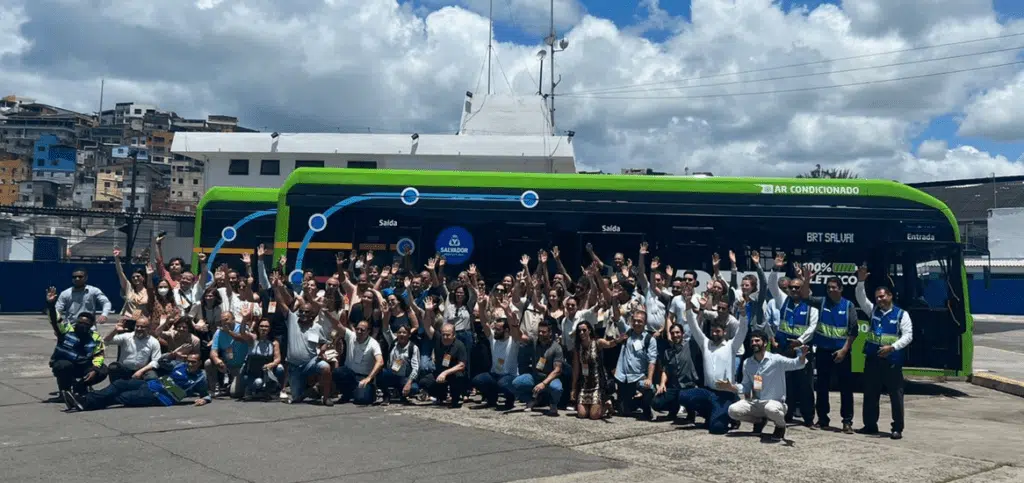By Daniel Moser
Dear Friends,
What a year this has been! Certainly other than expected… who figured health and resilience, pop-up bikelanes and green recovery would be so high on the agenda as they are now? Here are some things you shouldn’t miss out on!
Next up –>
TUMI TV is back: Tune in to watch on December 4!
On Friday, December 4th (1pm CET), we will take you on a cycling journey from Berlin to Bogotá, to Zhytomyr, to Hoi An, to Brazil, to India, to Frankfurt and other places to discover how COVID-19 has changed the role of cycling in our cities. Join our live stream on: https://live.transformative-mobility.org/
TUMI proudly presents: Part Two of online course on sustainable urban mobility starts on January 11 – enroll now!
The first part of the TUMI and the University College of London (UCL) online course is going fabulous with over 2500 interested participants – you still have two more weeks to conclude (if this is the first time you hear about it – you can still join Part One here).
If you enjoyed the video lectures, exercises, and interacting with your peer learners, you can start enrolling in the second course now: https://www.futurelearn.com/courses/components-of-sustainable-urban-mobility. This course will focus on different modes of sustainable mobility as well as modes to manage and govern to transform urban mobility. Please again share this opportunity widely with your friends and networks – see the course trailer and the flyer attached.
More news from TUMI Partners:
ITDP: Sustainable Transport Award at MOBILIZE goes to Jakarta
In 2020, the world’s cities have not stopped transforming and working towards more sustainable transport solutions. At the MOBILIZE conference, the Sustainable Transport Award was announced to Jakarta. Find here a list of the over 30 cities who applied for the STA 2021.
KfW: To protect the environment and commuters, KfW supports the expansion of Mumbai’s metro system
On behalf of the German Federal Ministry for Economic Cooperation and Development (BMZ), KfW has committed two loans for a total of EUR 545 million to the Indian Ministry of Finance. The Financial Cooperation project, which is being implemented by the Mumbai Metropolitan Region Development Authority (MMRDA), covers system components for Mumbai’s metro line 4, as well as footpaths and cycle routes surrounding the stations to improve integration within the transport system. Read more here
C40: Campaign announced to mobilise 1,000 cities for a green and just recovery to address global climate emergency
Today, C40 Cities, the Global Covenant of Mayors for Climate and Energy (GCoM) and CDP announced a campaign to recruit as many as 1,000 cities around the world to deliver inclusive climate action, consistent with constraining global temperature rise to 1.5°C set out in the Paris Agreement, and initiate a green and just recovery from COVID-19.
Read more here
WRI: New working paper launch on informal and semi-formal public transport systems in Latin America
Our TUMI Partner WRI share with us our latest working paper on “Informal and Semiformal Services in Latin America: An Overview of Public Transportation Reforms” that was just launched with support from the GEF and the IDB. WRI looked at the role of informal transport systems in the region, and how different cities have approached the spiky topic of reforming these to move towards formalized systems, with application to other regions as well.
WRI: Mexico Ratifies Landmark ‘Right to Mobility’ Constitutional Amendment
In a groundbreaking move for national road safety policy, Mexico has elevated to their constitution a universal right to safe mobility. On October 14, the country’s Chamber of Deputies unanimously voted in favor of adding an amendment to Mexico’s constitution. Ratification by Mexico’s states gives the country a mandate to advance a general safe mobility law, which activists hope will increase institutional support for addressing road safety issues. Read more here.
More news from around the world
- India: Successful launch of Indo-German Green Urban Mobility Partnership at Urban Mobility India conference 2020
At the fully digital Urban Mobility India conference (UMI) on 9th November 2020, four activities were launched by the Ministry of Housing and Urban Affairs (MoHUA): The Indo-German Green Urban Mobility Partnership (GUMP) was formally launched by Mr. Durga Shanker Mishra (Secretary, MoHUA) and Dr. Claudia Warning (BMZ, Director-General for Asia). Furthermore, the Executive Programme in Sustainable Transport, the Tactical Urbanism Guidebook, and the SMART MOVE – Innovative Urban Mobility Challenge were launched.
Please read more and find the entire video recording of the UMI conference here
- Georgia: Transforming urban mobility in the South Caucasus started
In October and November, two peer-to-peer trainings for 34 urban transport experts from Tbilisi took place, covering the topics of shared mobility, management systems, public transport strategy, marketing, and campaigning. Mobility4Cities brought experts for national transport policy making of Georgia and Germany together. The project also supports the first academic programme to train future Georgian transport experts through a collaboration between Technical University Dresden and Georgian Technical University. Further, Georgia will introduce a law on intercity connections to make city-to-city transport more efficient, reliable and safe.

Brazil

Georgia
- Brazil: First Conference of the National Platform for Electric Mobility (PNME)
From November 16th to 19th, the First Conference of the National Platform for Electric Mobility (PNME) in Brazil was held digitally. Supported by GIZ`s PROMOB-e Project, 45 speakers discussed a broad range of topics on electric mobility, from governance, green recovery and financing to vocational training, public transport and micro mobility. As Monica Araya, Transport Lead at Climate Champions, stated in her keynote speech, “electric mobility is not just about producing electric cars, it’s about transforming an entire ecosystem. It is about air quality, health, industrial strategies, and people’s mobility. ” If you want to learn more about the Platform, check out this vídeo and look out for the first Brazilian Electric Mobility Yearbook to be launched in January 2021.
- South-East Asia: Open Data webinar series
In November the ASEAN-German cooperation project SMMR organized an ‘Open Data in Urban Mobility Webinar series’. The series comprised 4 sessions and featured presentations from 13 Open Data and Smart Mobility experts. A summary of the event together with the 4 sessions recordings can be found on the SMMR website. More ASEAN and metropolitan activities are scheduled over the coming months in MTE, SUMP and HUBS.
Stay tuned and get in touch if themes developed by SMMR may be relevant in your Metropolitan region.
- Western Balkans: Southeast European capitals are implementing pilot projects derived from Sustainable Urban Mobility Action Plans
Six capitals of the Western Balkan Countries Belgrade, Podgorica, Pristina, Sarajevo, Skopje and Tirana started to implement their first Sustainable Urban Mobility Plans (SUMPs) in cooperation with actively involved representatives of the local authorities, stakeholders, NGOs, Academia, all interested citizens and local and international technical assistance. Adi Kalem, Minister of Transport of Sarajevo Canton says, “Our goal is to encourage citizens to continue but also increase the daily use of bicycles as a means of transport and to be able to come to work or perform administrative needs in the institutions, without fear that the bike will be stolen or left in potentially bad weather conditions”. The following pilot projects are part of GIZ’s regional initiative in the field of Sustainable Urban Mobility in South-East European countries. Please read more on the project here.
- Sarajevo has set up the covered bicycle parking lots on nine locations near public institutions for the needs of employees or citizens who come to perform an administrative task.
- Tirana is installing real time bike counters in two different points across the city to gather cycling statistics that can feed the future policy decision.
- Podgorica developed digital tool and application for the public transport system which allows users to plan their route with real time information and to purchase a ticket via the application
- Working jointly with the city of Skopje, national institutions, civil society organization and students, the project has developed the so called “Veloshtad”, a cycling square in City’s main transport centre where railway station, international bus station and local bus stations are interconnected.
- Belgrade prepared a concept for a Super block following the examples of EU cities, aiming at providing a better quality of life for its citizens
- Pristina developed a focused ‘Cycling Strategy’ that has set out a range of themed actions that aim to create conditions in using non-motorised transport. Moreover, in the light of risks posed by COVID19 pandemic, Pristina local bus transport are supported with liquid disinfectant, and barrier instalment that separate bus operators from passengers.
TUMI Events
See here: https://www.transformative-mobility.org/events
Up next:
- Dec 3 Webinar: Women and mobility: should transport be different? In this webinar, top experts discuss inclusive and gender-sensible mobility and its surprising effects on employment, development, and safety of communities worldwide. Register for the webinar here.
- Dec 8 Webinar: Navigating COVID-19 in the Mediterranean: Towards Responsive Transportation-Oriented Policies
This high-level Mediterranean Webinar will give a voice to the authors of the recently launched « CMI-FEMISE COVID-19 MED Briefs » and open-up a dialogue between researchers, stakeholders and the civil society in the Mediterranean. Register for the webinar here - Dec 10 Webinar: Joint TUMI & C40 Report launch Zero-Emission Areas
Transport and traffic are the biggest sources of greenhouse gas emissions in C40 Cities. This is why the C40 Cities have recognized the urgent need for ambitious climate action to achieve the goals of the Paris Agreement. The report “How C40 Cities are implementing Zero Emission Areas” analyses the approaches being taken by some leading cities to achieve this goal with holistic and multi-faceted thinking and a series of strategic actions designed to shift the whole urban mobility system onto a zero emissions trajectory. You are city staff and want to join the launch? Please get in touch and we will share information for registration!
- #MobilizeMinds
This year gave you the possibility to participate in so many low-threshold online events to learn more about sustainable mobility in its whole variety. Find a regularly updated webinar & recording list here: https://www.transformative-mobility.org/news/invest-in-your-knowledge-of-sustainable-mobility-webinars - Talking Transport Transformation – A TUMI Podcast
Recently launched Episode 08 is about Road Safety! Even though city officials and planners have introduced many safety precautions for road safety throughout the last decades – we still see way to many traffic fatalities on our roads. We talk about and understand this dilemma with Viktor Zagreba from Ukraine: Talking Transport Transformation – Podcast (podigee.io)
Wishing you a wonderful end of the year!
Best regards & stay healthy
Daniel
